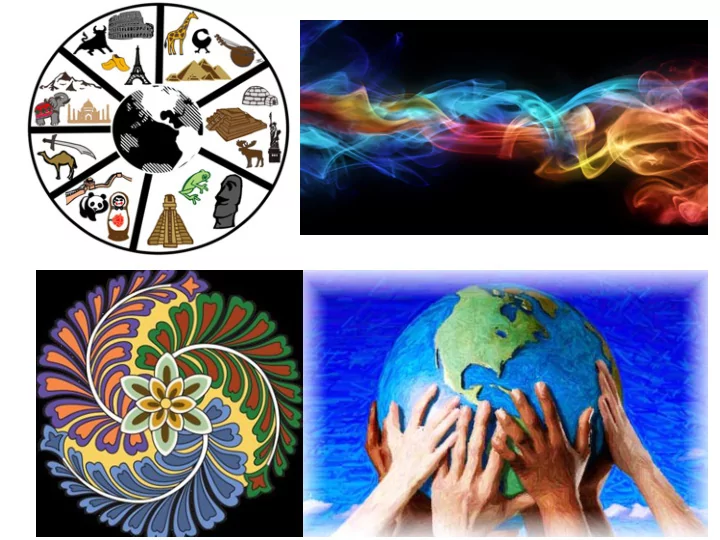

Cities networks metaphor Navigating “culture as flux”, the idea of culture as flow and that cultures are open, dynamic and constantly changing ‘entities’ or “practices”
Intercultural Competence • Council of Europe, Directorate of Democratic Citizenship and Participation. (2013). Developing Intercultural Competence through Education . Strasbourg: Council of Europe Publishing. • Council of Europe. (2012). Intercultural competence for all: Preparation for living in a heterogeneous world . Pestalozzi Series No. 2. Strasbourg: Council of Europe Publishing • Deardorff D. (2009) (ed.). The Sage Handbook Of Intercultural Competence . London: Sage. • Elbers E.P.J.M. (2010). Learning and social interaction in culturally diverse classrooms . In K. Littleton, C. Wood & J. Kleine Staarman (Eds.), International Handbook of Psychology in Education (pp. 277- 318). Bingley, UK: Emerald. • UNESCO. (2013). Intercultural competences: A conceptual and operational framework . Paris: UNESCO. Available from: http://unesdoc.unesco.org/images/0021/002197/219768e.pdf
Interultural competence(s) by the us • definition of intercultural competence : ability to communicate/work/live successfully in another culture; awareness that diversity is richness; • core competences : positive relation with others; agency; humour; knowledge that diversity is richness/is valued; acceptance of diversity; adaptability; listen to thers and to own’s feelings; empathy; curiosity; respect, interest and motivation in the other; good observation skills; learn as lll/from others;
From my “ delphi ”: 3 short definitions : Intercultural Competences is: • …awareness that nobody has inherited a self - sufficient and universally valid model to read, to understand, and to explain reality.
• …the capacity to mobilize in a culturally conscious way knowledge, skills, behaviors and values which enable an individual or a group to deal with volatile and unfamiliar problematic situations which derive from the encounter with persons socialized in a different culture with the (common) intention to find new and shared solutions.
• …five elements : • Attitudes : curiosity and openness, readiness to suspend disbelief about other cultures and belief about one's own. • Knowledge : of social groups and their products and practices in one's own and in one's interlocutor's country, and of the general processes of societal and individual interaction. • Skills of interpreting and relating : ability to interpret a document or event from another culture, to explain it and relate it to documents from one's own. • Skills of discovery and interaction : ability to acquire new knowledge of a culture and cultural practices and the ability to operate knowledge, attitudes and skills under the constraints of real-time communication and interaction. • Critical cultural awareness/political education : an ability to evaluate critically and on the basis of explicit criteria perspectives, practices and products in one's own and other cultures and countries.
9 Core competences Acceptance : Positively accepts behaviour and ideas that are very different from his/her own Accepting of people as they are and does not try to change them At ease with those who hold different views or values Looks for the best in others, and forgives any faux pas quickly and easily Analyzing context and interactions in their complex relationships Approaching cultural diversity: curiosity, listening, seeing from others’ perspectives Awareness of one’s own cultural norms and frames of reference / Awareness of the self in its relation with the other and the others
Awareness & some knowledge of the historical relationship between one’s own culture and the culture(s) interacting with – for example, there may be a former colonial relationship De-centering perspective. Decentration = the ability of perspective taking, to see the world from somebody else’s perspective Disposition to avoid using one’s own culture as the basis for making judgments about another / Disposition to question one’s own assumptions and how these affect what is ‘heard’ and how it is ‘translated’ in intercultural conversations / Insight into the ways in which one’s own cultural morns and references can act as a filter to experience and how one reads the world and the ‘Other’
Empathy (Self) awareness : Conscious that his/her own behaviour may be strange and/or difficult for others to understand or accept / Sensitive to how his/her own communication and behaviour is interpreted by others / Critical understanding of power relations and (intersecting) oppressions (Appreciation of critical thinking, reflection and self- evaluation ) Understanding of culture as something that is made relational ly, and that is therefore a fluid concept with porous boundaries
Facilitating Intercultural Learning • experiential learning • combine hands-on activities (e.g. use of specially designed activities that promote the competences listed earlier; research projects etc.) with dialogue and critical analysis. • use a variety of resources (e.g. movies, images, songs etc.) but then engage in in-depth analysis of the issues arisen in the different stories/narrative etc. • engage participants in action research on their own practices in relation to cultural diversity in order to devise specific plans of action to change those practices that may be discriminatory. • there needs to be clarity over ‘what’ one is in dialogue and being critical about and the foundations of these.
Criticism • learning is limited only to those that are willing to undertake it. Many people (these days in Europe – the majority) are not willing to engage in intercultural learning – while they seem to be the people that need it the most; • experience is not a way to avoid or take away stereotypes. The role of the instructor in above statement is unclear; • although experiential learning can be very effective, it can also lead to some practices that are exploitative e.g. where the emphasis is on the person ‘gaining’ experiences and not on the host(s) of those experiences
Recommend
More recommend